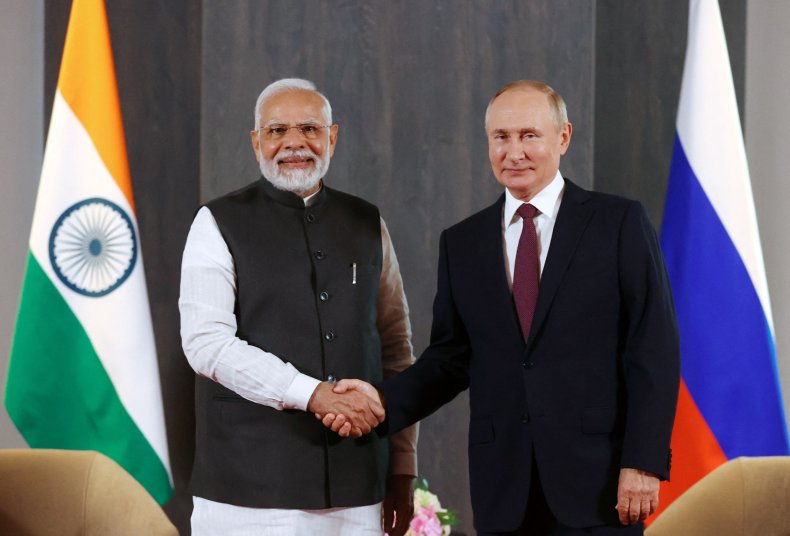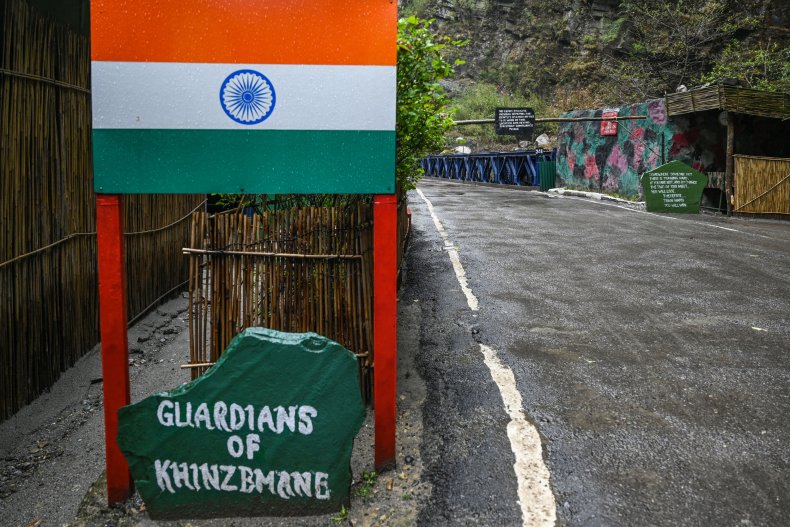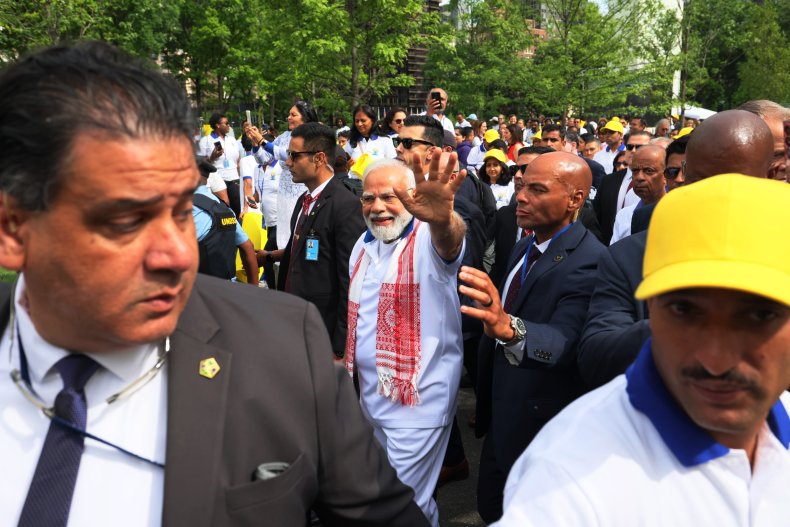TOM O'CONNOR
As Indian Prime Minister Narendra Modi heads to Washington to meet with U.S. President Joe Biden, much of the fanfare surrounding the visit is focused on announcements regarding the growing partnership between the two nations. But while the White House seeks to isolate Russia over its war in Ukraine, New Delhi remains steadfast in its commitment to a deep-rooted relationship with Moscow.
Although tensions continue to simmer between India and China, with whom Russia has cultivated increasingly close relations, New Delhi counts on its unique dynamic with Moscow to realize its interests and serve as a buffer to Beijing.
Former Indian Foreign Secretary Nirupama Rao explained that "a good part of India's strategy to deal with a belligerent Beijing runs through Washington." At the same time, she argued, "it also runs through Moscow."
"I think China is being given quite a free hand in in Asia and Eurasia," Rao, who also previously served as ambassador to the U.S., China and Sri Lanka, said during a discussion hosted by the Defense Priorities think tank, "especially with the deteriorating situation in Ukraine, and a very boxed-in Russia."
"And at this moment, I think India feels that it cannot afford to neglect its relationship with Russia," she added, "because I think it also helps that that connection is in a way a means to counter China's, in a sense, monopolizing of the space within Asia."
This dynamic also extends to the multilateral institutions of which China, India and Russia are members, such as BRICS and the Shanghai Cooperation Organization (SCO).
"India has been working with BRICS and the SCO," Rao said, "and, as you know, this presence, especially against the context of the war in Ukraine, kind of raises eyebrows in the West."
 Russian President Vladimir Putin (right) meets with Indian Prime Minister Narendra Modi on the sidelines of the Shanghai Cooperation Organization (SCO) leaders' summit in Samarkand on September 16, 2022. The SCO is comprised of China, India, Kazakhstan, Kyrgyzstan, Pakistan, Russia, Tajikistan and Uzbekistan, with Iran soon to be admitted as a full member, and others such as Saudi Arabia also seeking closer ties.
Russian President Vladimir Putin (right) meets with Indian Prime Minister Narendra Modi on the sidelines of the Shanghai Cooperation Organization (SCO) leaders' summit in Samarkand on September 16, 2022. The SCO is comprised of China, India, Kazakhstan, Kyrgyzstan, Pakistan, Russia, Tajikistan and Uzbekistan, with Iran soon to be admitted as a full member, and others such as Saudi Arabia also seeking closer ties.While Rao acknowledged criticisms "that India treats the SCO and such membership organizations where Russia is a member in a rather stepmotherly way, and it seems to be focusing more on its relations with the West, particularly the United States," she argued that "India sees the necessity for maintaining these Eurasian connections."
"I think a lot of Central Asian countries want India there," Rao said. "They are a little apprehensive of China's moves in the region and what China's intentions are, which are not very clear. So, in that sense, we have friends among these nations who welcome India's participation."
She described India as a "very important power in the region" and one well-suited to participate in BRICS talks regarding development and SCO discussions around connectivity and counterterrorism.
"Given India's geographical position, where we are in South Asia, I think these connections, these channels that we keep open work for India," Rao said. "And I think India definitely acts to protect its interests and to keep those security concerns and the dialogues that we've traditionally had with countries of this region going."
The longstanding partnership between Moscow and New Delhi has its origins in the decade following India's independence from the United Kingdom and bloody partition with Pakistan in 1947. The Soviet Union became a primary supporter of the new, vast nation on the subcontinent, even as India became mired in border conflicts with U.S.-aligned Pakistan and a resurgent China, which repeatedly objected to the Soviet position as ties between the two communist powers began to disintegrate in the 1960s.
"The Soviet relations with China were also deteriorating and it began to see India as a balance against China, and I do think that view has entirely changed," Rao said. "It is true that Russia and China have come closer together with almost a confederacy today, but it is also a relationship of convenience as we see it."
She argued that, still today, "a strong India works for Russia," and that, in spite of the warm ties between Russian President Vladimir Putin and Chinese President Xi Jinping, Putin and Modi "have a relationship that I think is far freer than the relationship that Xi Jinping and Putin may have."
Among the most tangible ways in which the partnership between India and Russia lives on is in the field of defense. Rao noted how Russian equipment accounts for some 80 percent of the Indian Navy's arsenal, along with 70 percent of that possessed by the Indian Air Force and 60-65 percent of that wielded by the Indian Army.
"You cannot say that Russia is the past and America is the future," Rao said. "I mean we'd like to put it in such simple terms, but it doesn't work that way. I think the past, the present and the future are all so mixed up in this situation."
Even as India strives to diversify its arsenal and seek Western arms, Rao said such an endeavor was "not going to happen so easily." In the meantime, she said India would continue to invest in its relationship with the U.S. and its Quadrilateral Security Dialogue (QUAD) also led by Australian and Japan, while maintaining the historical partnership with Russia as well.
"I don't believe Russia is against our closer relations relationship with the United States," Rao said. "It is suspicious of what we do in the QUAD, just as China is, but this relationship between India and Russia continues to work. It is not falling apart, and I don't believe for us in India, given our interests, we would want it to fall apart, even as we engage in a much closer fashion with the United States."
Nandan Unnikrishnan, a distinguished fellow at the Observer Research Foundation in New Delhi, also attested to the significance of the India-Russia relationship, through which he said "there are multiple levels at which India has benefitted," including the "strategic, political and economic."
And while he asserted that "India sees its relationship with the U.S. as the most consequential relationship currently," a trend he said was "driven by China's rise," he echoed Rao in pointing out that Russia played a key part in this strategy as well.
"Surprisingly to the Western audience, India also sees a role for Russia as a balancer against China, particularly in Eurasia," Unnikrishnan told Newsweek. "But the relationship between Russia and China will be one that is closely monitored by New Delhi given the U.S.-China confrontation and the war in Ukraine."
 This picture taken on April 4 shows an Indian border post near the disputed frontier with China in Khinzemane, in India's Arunachal Pradesh state, much of which China claims as part of "South Tibet." The area was the site of a deadly war fought between the neighbors in 1962 and, six decades later, freshly laid roads, bridges, upgraded military camps and new civilian infrastructure dot the winding high Himalayan route to the Indian frontier village of Zemithang, which China renamed "Bangqin" last month to press its claim to the area.ARUN SANKAR/AFP/GETTY IMAGES
This picture taken on April 4 shows an Indian border post near the disputed frontier with China in Khinzemane, in India's Arunachal Pradesh state, much of which China claims as part of "South Tibet." The area was the site of a deadly war fought between the neighbors in 1962 and, six decades later, freshly laid roads, bridges, upgraded military camps and new civilian infrastructure dot the winding high Himalayan route to the Indian frontier village of Zemithang, which China renamed "Bangqin" last month to press its claim to the area.ARUN SANKAR/AFP/GETTY IMAGESAnd Unnikrishnan too saw no contradiction in New Delhi's stance which he argued was rooted in promoting India's interests first.
"India doesn't view geopolitics as a game in which you have to choose sides," Unnikrishnan told Newsweek. "India understands geopolitics as an arena in which it has to protect its interests, almost identical to the U.S. understanding of geopolitics except without the heft that the U.S. has."
"Indian policymakers do not see contradictions in simultaneously being members of the Indo-Pacific Quad, the I2U2 [India, Israel, the United Arab Emirates and the U.S.] in the Middle East, and membership of SCO or BRICS," he added, "basically, different horses for different races."
Gleb Makarevich, a junior research fellow at the Moscow State Institute of International Relations (MGIMO), took a similar position from Russia's perspective.
"I do not see any risk of promoting the kind of bloc-building mentality of the Cold War in India's steps. Its involvement in QUAD and I2U2 does not entail eagerness for military buildup in the Indian Ocean," Makarevich told Newsweek. "On the contrary, India stands for a peaceful and non-aggressive agenda in these organizations."
"Russian leadership and expert community appreciate India's strategic autonomy," he added. "I suppose that concept throughout Indian elites is unlikely to change."
India has traditionally rejected any formal alliances in the West or the East, and has instead invested in stepping up its role in an array of multilateral institutions, including the Group of 20 (G20), the influential body of major economies also including China, Russia and the U.S. and of which India currently serves as chair.
After the G20's top diplomats met in March, Indian External Affairs Minister Subrahmanyam Jaishankar said that the gathering had failed to release a joint statement over "divergence" on the war in Ukraine.
Makarevich argued that "India did not condemn Russian actions in Ukraine since the conflict is unlikely to affect its critical interests." And he highlighted how Moscow has "put a premium on the Indian stance in such sensitive issues as Kashmir [and] Afghanistan," while raising the "Indian profile on the international arena" along with "its resolve to achieve technological sovereignty" among other aims.
"Consequently, Indian leadership took into account Russia's concerns about NATO expansion, its military build-up and took a neutral stance in the conflict," Makarevich said, "preferring maintenance and further expansion of collaboration in traditional spheres—defense cooperation, nuclear energy sector—and exploring new fields."
"At the same time," he added, "Russia was eager to recalibrate its foreign trade— primarily, gas and oil flows—so as to substitute former counterparts from the West and finally conduct its long-proclaimed pivot to the East."
And while this pivot has largely entailed a rapid uptick in interactions with China, Makarevich expressed confidence "that intensifying India-U.S. and Russia-China ties do not affect the strategic partnership between Russia and India."
"I am positive that Russia will not seek deepening ties with China at the expense of the partnership with India," he said. "Indian leadership does not pursue harming Indo-Russian ties as well. I am convinced that both sides are aware of the counterpart's concerns and do not appear to sacrifice those trustful relations for any fleeting gain."
 Indian Prime Minister Narendra Modi waves to supporters after performing yoga on the North Lawn of the United Nations headquarters on June 21, the International Day of Yoga, in New York City. The Indian premier is next set to travel to Washington, D.C. to meet with U.S. President Joe Biden.MICHAEL M. SANTIAGO/GETTY IMAGES
Indian Prime Minister Narendra Modi waves to supporters after performing yoga on the North Lawn of the United Nations headquarters on June 21, the International Day of Yoga, in New York City. The Indian premier is next set to travel to Washington, D.C. to meet with U.S. President Joe Biden.MICHAEL M. SANTIAGO/GETTY IMAGESThe U.S., for its part, has largely avoided direct criticism of India's ongoing ties with Russia. Washington has opted not to implement sanctions against New Delhi for buying Russian oil amid the war in Ukraine and for acquiring the S-400 surface-to-air missile system as part of a $5 billion defense deal reached by Modi and Putin in 2018.
India's rise in recent years has given the nation that surpassed China this year to become the world's most populous and seeks to become the world's third-largest economy by the end of the decade a stronger hand in international affairs.
Still, as noted by Nivetida Kapoor, a post-doctoral fellow at the National Research University Higher School of Economics in Moscow, India's limited clout as a "middle power" also fuels its willingness to deal with an array of nations, including Russia.
"The U.S. and China outstrip other powers in the overall distribution of capabilities, and this constrains the conduct of middle powers in general, even if the latter have power to influence outcomes in specific contexts or geographies," Kapoor told Newsweek. "So, India as a middle power has decided to deal with the constraints imposed by its limited capacities by engaging in a multi-alignment policy, which avoids alliance relationships but rather engages with other powers based on alignment of interests."
But this position could become endangered should the geopolitical environment continue to worsen around the larger powers.
"The rise in the priority of the China issue in India has added to the commonality of interests with the U.S.," Kapoor said. "This does not mean India will abandon its other engagements but given the factors mentioned above, I think that while bilateral cooperation with Russia will continue based on mutual interests, it will be much more difficult to expand cooperation at the regional and multilateral level."
"A lot will now depend on a combination of how the U.S.-China rivalry pans out, how Russia-West ties develop, what happens to future Russian positioning in the East and how China behaves towards its neighbors," she added, "which will in turn impact India's policies towards both China and Russia."
Also paramount to this balancing act at the center of which is advancing India's national interests is avoiding the border dispute between China and India from devolving into an all-out war. Rather than serve to boost India's position, Kapoor argued such a conflict could prove devastating to the country's aspirations on the world stage.
"There is no denying that India needs to focus on its own economic development and the improvement of the lives of millions of its own people if it wants to become a more influential power in the international system," Kapoor said. "Therefore, a war is a wholly undesirable situation."
No comments:
Post a Comment